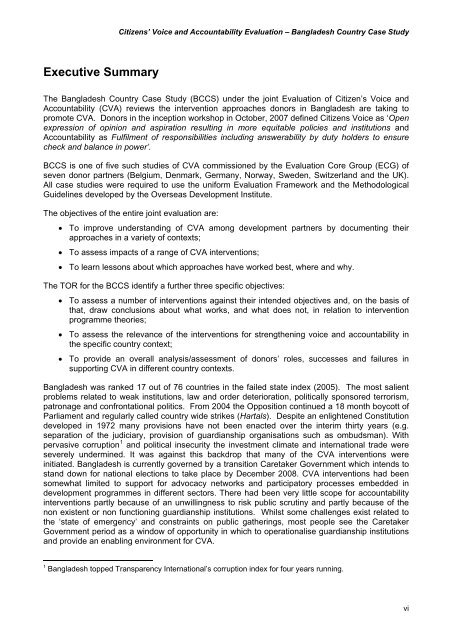Bangladesh - Belgium
Bangladesh - Belgium
Bangladesh - Belgium
Create successful ePaper yourself
Turn your PDF publications into a flip-book with our unique Google optimized e-Paper software.
Citizens’ Voice and Accountability Evaluation – <strong>Bangladesh</strong> Country Case Study<br />
Executive Summary<br />
The <strong>Bangladesh</strong> Country Case Study (BCCS) under the joint Evaluation of Citizen’s Voice and<br />
Accountability (CVA) reviews the intervention approaches donors in <strong>Bangladesh</strong> are taking to<br />
promote CVA. Donors in the inception workshop in October, 2007 defined Citizens Voice as ‘Open<br />
expression of opinion and aspiration resulting in more equitable policies and institutions and<br />
Accountability as Fulfilment of responsibilities including answerability by duty holders to ensure<br />
check and balance in power’.<br />
BCCS is one of five such studies of CVA commissioned by the Evaluation Core Group (ECG) of<br />
seven donor partners (<strong>Belgium</strong>, Denmark, Germany, Norway, Sweden, Switzerland and the UK).<br />
All case studies were required to use the uniform Evaluation Framework and the Methodological<br />
Guidelines developed by the Overseas Development Institute.<br />
The objectives of the entire joint evaluation are:<br />
• To improve understanding of CVA among development partners by documenting their<br />
approaches in a variety of contexts;<br />
• To assess impacts of a range of CVA interventions;<br />
• To learn lessons about which approaches have worked best, where and why.<br />
The TOR for the BCCS identify a further three specific objectives:<br />
• To assess a number of interventions against their intended objectives and, on the basis of<br />
that, draw conclusions about what works, and what does not, in relation to intervention<br />
programme theories;<br />
• To assess the relevance of the interventions for strengthening voice and accountability in<br />
the specific country context;<br />
• To provide an overall analysis/assessment of donors’ roles, successes and failures in<br />
supporting CVA in different country contexts.<br />
<strong>Bangladesh</strong> was ranked 17 out of 76 countries in the failed state index (2005). The most salient<br />
problems related to weak institutions, law and order deterioration, politically sponsored terrorism,<br />
patronage and confrontational politics. From 2004 the Opposition continued a 18 month boycott of<br />
Parliament and regularly called country wide strikes (Hartals). Despite an enlightened Constitution<br />
developed in 1972 many provisions have not been enacted over the interim thirty years (e.g.<br />
separation of the judiciary, provision of guardianship organisations such as ombudsman). With<br />
pervasive corruption 1 and political insecurity the investment climate and international trade were<br />
severely undermined. It was against this backdrop that many of the CVA interventions were<br />
initiated. <strong>Bangladesh</strong> is currently governed by a transition Caretaker Government which intends to<br />
stand down for national elections to take place by December 2008. CVA interventions had been<br />
somewhat limited to support for advocacy networks and participatory processes embedded in<br />
development programmes in different sectors. There had been very little scope for accountability<br />
interventions partly because of an unwillingness to risk public scrutiny and partly because of the<br />
non existent or non functioning guardianship institutions. Whilst some challenges exist related to<br />
the ‘state of emergency’ and constraints on public gatherings, most people see the Caretaker<br />
Government period as a window of opportunity in which to operationalise guardianship institutions<br />
and provide an enabling environment for CVA.<br />
1 <strong>Bangladesh</strong> topped Transparency International’s corruption index for four years running.<br />
vi

















